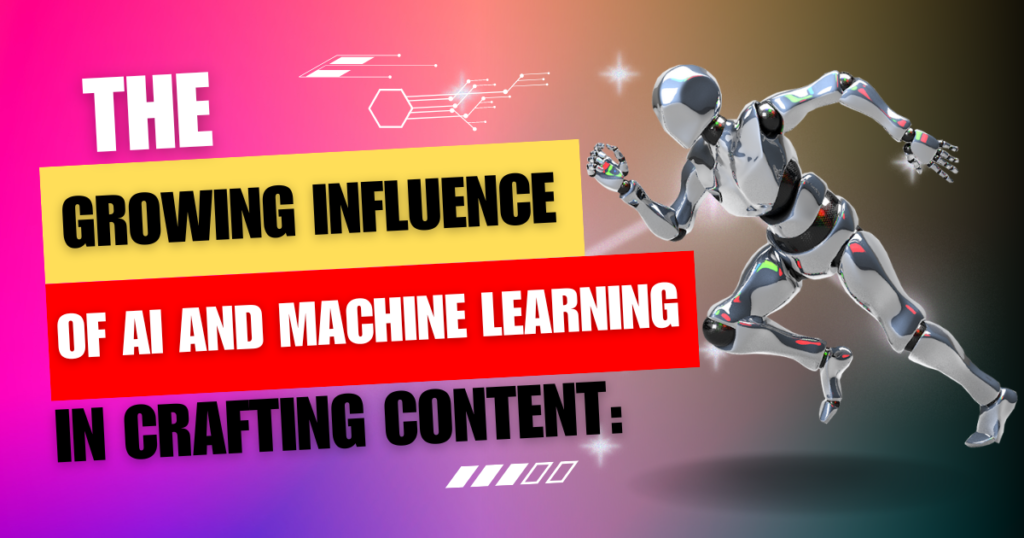Introduction
In the rapidly evolving digital world, keeping up with Content marketing trends is essential to staying competitive. The way consumers interact with content is constantly evolving, driven by technological advancements and changing preferences. As we move into 2024, several key trends are emerging that content marketers need to be aware of to effectively engage their audiences and achieve their marketing goals.
The Growing Influence of AI and Machine Learning in Crafting Content:

Artificial intelligence (AI) and Machine learning are transforming content marketing by enabling more efficient and creative content production. These technologies can automate various aspects of content creation, from generating article drafts to personalizing content for individual users. AI tools can analyze vast amounts of data to understand audience preferences and predict what type of content will perform best. This not only saves time but also enhances the quality and relevance of the content, leading to higher engagement rates.
Video Content Dominance:
Video content continues to dominate the digital space, with consumers increasingly preferring visual and dynamic forms of media. In 2024, short-form videos, live streaming, and interactive videos are expected to be particularly popular. Brands should focus on creating compelling video content that captures attention quickly and encourages interaction. Incorporating video into your content strategy can significantly boost engagement and retention rates, making it a powerful tool for storytelling and brand communication.
Voice Search Optimization:
The widespread use of voice-activated devices such as smart speakers and virtual assistants is revolutionizing the way people search for information online. As a result, optimizing content for voice search is becoming essential. Voice searches trend to be more conversational and question-based, so content should be structured to provide clear and concise answers. Implementing strategies for voice search SEO can help ensure that your content is easily discoverable by users utilizing voice commands.
Personalized Content Experiences:
Consumers are increasingly expecting personalized experiences tailored to their individual preferences and behaviors. Content marketing agencies can leverage hyper-personalization, using data analytics and segmentation to create content that resonates with specific audience segments. By utilizing tools and technologies that enable personalized content delivery, content marketing agencies can help brands enhance user engagement and build stronger relationships with their audiences. Personalized content not only improves the user experience but also drives higher conversion rates.
The Emergence of Interactive Content:
Interactive content, such as quizzes, polls, and interactive infographics, is gaining traction due to its ability to engage users actively. Unlike static content, interactive formats encourage participation and can provide valuable insights into audience preferences. Interactive content also has the potential to generate higher levels of engagement and lead generation. Brands should explore creative ways to incorporate interactivity into their content strategy to capture and retain audience attention.
Focus on Sustainability and Social Responsibility:
Incorporating sustainability and social responsibility into Content marketing agencies is becoming increasingly important. Consumers are more conscious of environmental and ethical issues and prefer brands that align with their values. By highlighting sustainable practices and social initiatives, content marketing agencies can help brands build trust and loyalty among their audience. Sharing stories about corporate social responsibility efforts and sustainable practices can differentiate your brand and resonate with socially conscious consumers.
Expansion of Influencer Marketing:
Influencer marketing continues to evolve, with a growing emphasis on authenticity and niche influencers. Collaborating with the right influencers can help brands reach targeted audiences and build credibility. In 2024, micro-influencers and nano-influencers, who have smaller but highly engaged followings, are expected to play a significant role. Measuring the ROI of influencer campaigns and ensuring that collaborations align with brand values are crucial for successful influencer marketing.
Data-Driven Content Strategies:
Data analytics is at the core of effective content marketing. In 2024, leveraging data to inform content strategies will be more important than ever. Analyzing key metrics such as engagement rates, conversion rates, and audience demographics can provide valuable insights into what content works best. Using tools for data collection and analysis can help marketers make informed decisions and optimize their content for better performance.
The Importance of User-Generated Content (UGC):
User-generated content (UGC) offers authenticity and can significantly enhance brand credibility. Encouraging customers to create and share content related to your brand can build a sense of community and trust. UGC campaigns can include testimonials, reviews, social media posts, and more. Highlighting user-generated content in your marketing efforts not only engages your audience but also provides social proof that can influence potential customers.
Content Distribution and Repurposing:
Effective content distribution is key to maximizing reach and impact. In 2024, Content marketing agencies should focus on distributing content across multiple channels and repurposing it for different platforms. For instance, a blog post can be transformed into a video, an infographic, or a social media update. Repurposing content ensures that it reaches a broader audience and extends its lifecycle. By strategically distributing and repurposing content, content marketing agencies can help brands enhance their visibility and engagement.

Conclusion
As we look ahead to 2024, staying updated with the latest Content marketing trends is essential for success. From AI-driven content creation to the dominance of video and the importance of personalized experiences, these trends highlight the need for innovation and adaptability. By embracing these trends and incorporating them into your content strategy, you can effectively engage your audience and achieve your marketing objectives.
FAQ:
Q: What are the benefits of using AI and machine learning in content marketing?
*A:) AI and machine learning enhance content marketing by automating tasks like content creation and personalization. They analyze data to predict audience preferences, saving time and improving content quality for higher engagement rates.
Q: How can I optimize my content for voice search in 2024?
*A:) To optimize for voice search, focus on conversational and question-based content. Use natural language that directly answers common queries related to your industry, ensuring your content is easily discoverable through voice-activated devices.
Q: Why is personalized content important, and how can I implement it effectively?
*A:) Personalized content improves user engagement and conversion rates by catering to individual preferences. Implementing it involves leveraging data analytics to understand audience segments and delivering tailored content experiences that resonate with each group.








